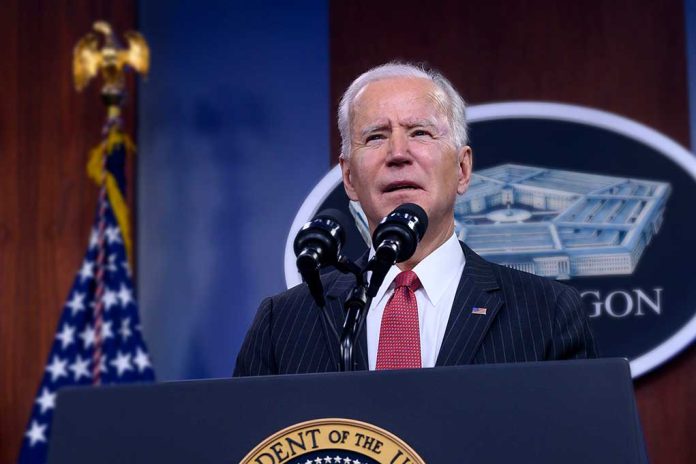
President Biden issues stern warning to Iran: any attack on Trump will be met with war.
At a Glance
- Biden warns Iran that attacking Trump over Soleimani’s killing would be an act of war
- Iran has made credible threats against Trump and other former officials
- U.S. intelligence briefed Trump campaign about heightened assassination threats
- Government struggles to protect all at-risk former officials
- Situation highlights challenges in adapting U.S. security measures to new threats
Biden’s Stern Warning to Iran
President Joe Biden has issued a forceful warning to Iran, declaring that any attempt to harm former President Donald Trump in retaliation for the 2020 assassination of Iranian General Qassem Soleimani would be considered an act of war. This stark message comes amid credible threats against Trump and other former U.S. officials involved in the Soleimani operation, underscoring the gravity of the situation and the potential for severe consequences in U.S.-Iran relations.
The escalating tensions have prompted Trump’s campaign to request enhanced security measures typically reserved for sitting presidents, including military aircraft and armored vehicles. These extraordinary requests highlight the seriousness of the perceived threat and the challenges faced by U.S. authorities in protecting former officials from foreign adversaries.
Extensive Iranian Threats
Iran’s efforts to seek revenge for Soleimani’s death are more extensive than previously reported. According to U.S. intelligence, these efforts involve hacking, digital surveillance, and attempts to track U.S. officials abroad. The Islamic Republic has been issuing threats and creating propaganda videos targeting Trump and others involved in the Soleimani strike, seeking their arrest and promising retribution. “Iran has made it very clear that they are determined to seek retaliation against former officials in connection with the Soleimani strike,” said Matt Olsen, the Justice Department’s assistant attorney general for national security.
The severity of these threats has led to increased concerns within the U.S. government. Rep. Jim Himes (D-Conn.), the ranking member of the House Intelligence Committee, emphasized the potential consequences, stating, “The U.S. would regard it as an act of war.” This sentiment aligns with President Biden’s strong stance against any Iranian aggression towards former U.S. officials.
Challenges in Protecting Former Officials
The U.S. government is grappling with the complex task of providing adequate protection for all at-risk former officials. Congress has allocated significant funds for this purpose, but some individuals, particularly former National Security Council officials, remain largely unprotected. The Secret Service and other agencies are stretched thin, forcing some former officials to spend considerable sums on private security.
This statement underscores the personal nature of Iran’s quest for revenge and the long-term nature of the threat. Some experts draw parallels to the fatwa against author Salman Rushdie, suggesting that the danger to Trump and other officials may persist indefinitely. The situation has exposed gaps in the U.S. security apparatus and highlighted the need for a more comprehensive approach to protecting former officials from evolving international threats.
Implications for U.S.-Iran Relations
The current situation has significant implications for U.S.-Iran relations. President Biden’s administration has consistently warned Iran of severe consequences if it attacks U.S. citizens, including former officials. This stance represents a continuation of the previous administration’s approach, with former President Trump having threatened a response “1,000 times greater in magnitude” to any Iranian attack.
As tensions remain high, the U.S. government faces the challenge of balancing diplomatic efforts with the need to protect its citizens and former officials. The situation underscores the complex dynamics of international relations and the lasting impact of critical foreign policy decisions, such as the Soleimani assassination, on national security and diplomatic relations.














